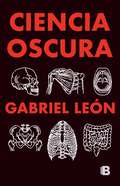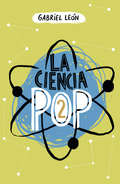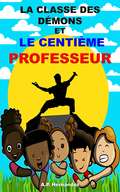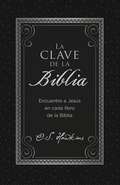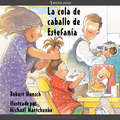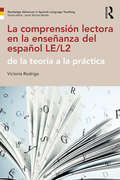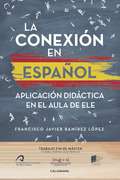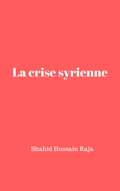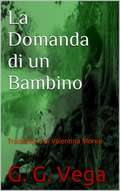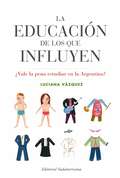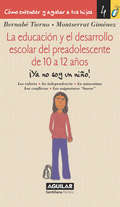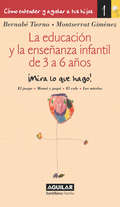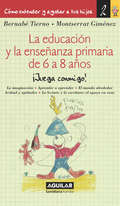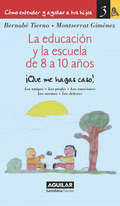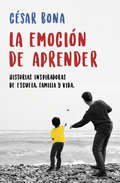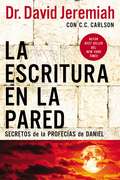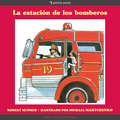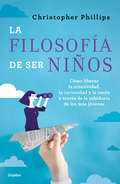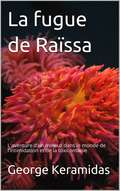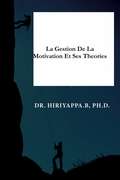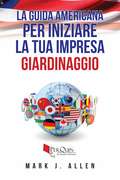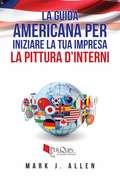- Table View
- List View
La ciencia oscura
by GABRIEL LEONCrónica de divulgación científica que relata aquellas investigaciones y experimentos reñidos con la ética, al punto de poner en peligro la salud y la vida de quienes participaron en ellos. Sin tener en cuenta la ética ni el bienestar de hombres y mujeres, la historia de la ciencia acumula experimentos transgresores, crueles y con consecuencias irreparables para quienes participaron en ellos. El divulgador científico más seguido en Chile, Gabriel León, nos presenta investigaciones médicas como las esterilizaciones forzadas, los experimentos dermatológicos en cárceles, la separación al nacer de gemelos idénticos para análisis sicológicos y un largo y horroroso etcétera narrado con la claridad, potencia y los fundamentos que lo han convertido en uno de los autores best sellers de la divulgación científica en Chile.
La ciencia pop 2
by Gabriel LeonUn compilado de crónicas sobre eventos de la ciencia destinado a un público no especializado Repitiendo la fórmula de su primera versión, Ciencia pop 2 entrega nuevas historias y hazañas científicas. Biografías, descubrimientos, accidentes, errores e incógnitas son abordadas mediante una pluma informada y fascinante. Historias que son capaces de enseñar y, a la vez, de abrir puertas de una materia enigmática y estremecedora, pero al mismo tiempo, presente en todo lo que nos rodea.
La classe des démons et le centième professeur
by A. P. HernándezLa classe de CE2 B est surnommée la classe des démons. Parce que c'est une classe qui répand la terreur. Elle est dirigée par 25 enfants espiègles de huit ans. Ils ont déjà eu 99 professeurs et aucun n'a réussi à les supporter. Aujourd'hui, le centième professeur fait son arrivée. Les démons ne vont pas tarder à comprendre qu'ils ont face à eux un professeur très spécial.
La clave de la Biblia: Encuentre a Jesús en cada libro de la Biblia
by O. S. HawkinsEn La clave de la Biblia, los lectores comprenderán la presencia de Jesús en el Antiguo Testamento de una manera nueva, mientras viajan con el Pastor O. S. Hawkins a través de cada libro de la Biblia.A menudo asumimos que Jesús solo está en el Nuevo Testamento. Incluso pensamos en Él de manera diferente que «el Dios del Antiguo Testamento». Sin embargo, Cristo aparece en todos los libros de la Biblia, a veces en palabras, a veces en la sombra, a veces en la profecía. Como Jesús se reveló a los dos discípulos en el camino a Emaús, se le puede encontrar «en todas las Escrituras» (Lucas 24:27). Y a medida que aprendemos a encontrar a Jesús en cada versículo, también nos damos cuenta de su presencia constante en nuestras vidas.En La clave de la Biblia, el autor más vendido de La clave de Josué, O. S. Hawkins, nos lleva del Génesis al Apocalipsis mientras ilumina las Escrituras a través de la luz de Cristo. Porque toda la Biblia, y toda la vida, de hecho, se trata de Jesús. En Éxodo, Él es el Cordero de la Pascua. En Deuteronomio, Él es el pan de vida. En Cantar de los Cantares, Él es nuestro novio.¿Cómo crece nuestra comprensión de Dios como proveedor al comprender la voluntad de Abraham de sacrificar a Isaac? ¿Qué tiene que ver el cordón escarlata de Rahab en el libro de Josué con el sacrificio de Jesús en la cruz? ¿Cómo se relaciona la referencia de Jesús a sí mismo como el Buen Pastor con los Salmos, y qué nos enseña eso sobre el carácter de Dios?Cuando buscamos a Jesús en toda la Biblia, encontramos vida. No solo vida eterna en el entonces y allí, sino vida abundante en el aquí y ahora. Únase a O. S. Hawkins en esta hermosa exploración de las profundidades de las Escrituras. Cuando vea la historia redentora de Jesús desde la creación hasta la eternidad, se acercará al Dios que lo ha amado desde el principio.The Bible CodeWe often assume Jesus is only in the New Testament. We even think of Him differently than "the God of the Old Testament." Yet Christ appears in every book of the Bible, sometimes in words, sometimes in shadow, sometimes in prophecy. As Jesus revealed to the two disciples on the road to Emmaus, He can be found "in all the Scriptures" (Luke 24:27). And as we learn to find Jesus in every verse, we realize His constant presence in our lives as well.In The Bible Code, bestselling author of The Joshua Code, O. S. Hawkins, takes us from Genesis to Revelation as he illuminates Scripture through the light of Christ. Because all of the Bible, and all of life for that matter, is about Jesus. In Exodus, He is the Passover Lamb. In Deuteronomy, He is the Bread of Life. In Song of Solomon, He is our Bridegroom.How does our understanding of God as provider grow through understanding Abraham's willingness to sacrifice Isaac? What does Rahab's scarlet cord in the book of Joshua have to do with Jesus' sacrifice on the cross? How does Jesus' reference to Himself as the Good Shepherd relate to the Psalms, and what does that teach us about God's character?As we seek Jesus in the whole Bible, we find life. Not just eternal life in the then and there, but abundant life in the here and now. Join O. S. Hawkins in this beautiful exploration into the depths of Scripture. As you see Jesus' redemptive story from Creation to eternity, you will draw closer to the God who has loved you from the beginning.
La cola de caballo de Estefanía
by Robert Munsch Michael MartchenkoNinguno de los compañeros de clase de Estefanía se recoge el pelo en una cola de caballo. Entonces Estefanía decide hacerse una. Los demás niños le gritan: "¡Qué fea! Qué fea!". Pero a Estefanía no le importa. Cuando todas las niñas se copian de ella, Estefanía decide probar un peinado nuevo. En el estilo típico de Munsch, cada una de las colas de caballo de Estefanía es más disparatada que la anterior, y la lista de copiones sigue creciendo . . .
La comprensión lectora en la enseñanza del español LE/L2: de la teoría a la práctica
by Victoria RodrigoLa comprensión lectora en la enseñanza del español LE/L2: de la teoría a la práctica presents state-of-the-art theory and teaching practices for integrating reading skills into the teaching of Spanish. The book bridges a conspicuous gap between research supporting reading as a key component of language acquisition and actual practice by discussing how to implement reading successfully in and out of the classroom. Written entirely in Spanish, the book focuses on the needs of Spanish language learners with the goal of motivating students to read in the target language and work with diverse types of texts and genres. Written in a clear and accessible manner, La comprensión lectora en la enseñanza del español LE/L2: de la teoría a la práctica is an essential resource for teachers of Spanish at all levels. It is an excellent reference book for language teachers who wish to integrate reading into the teaching of the Spanish language.
La conexión en español: Aplicación didáctica en el aula de ELE
by Francisco Javier Ramírez LópezEl lector especializado encontrará en este libro una propuesta para aplicar en un aula de español. La conexión implícita ha gozado de muy poca atención por parte de quienes se dedican a la enseñanza del español como segunda lengua. Esto se debe a la complejidad lingüística y discursiva del tema. <P><P>Ahora bien, la conexión implícita se asienta no solo en el conocimiento y en la comprensión de los mecanismos de conexión tal y como estos se materializan en la estructura superficial, sino también en la capacidad del hablante para inferir los significados ocultos en la estructura profunda. <P><P>Para que esta labor de inferencia tenga éxito, emisor y receptor han de compartir el saber enciclopédico; esto es, han de compartir en la medida de lo posible un mismo bagaje formado por los conocimientos sociolingüísticos, culturales, etc. <P>Por todo ello, parece acertado establecer como destinatarios de nuestra propuesta a hablantes de español como segunda lengua con un nivel C1.
La crise syrienne: Passé, présent et futur
by Shahid Hussain RajaLa situation en Syrie est un échantillon de ce qui se passe au Moyen-Orient qui, en raison de son histoire, de sa situation géostratégique, de l'abondance de ses ressources et de sa politique de puissance régionale/mondiale, est en proie à des bouleversements depuis environ un demi-siècle. La situation s'est complexifiée avec l'intensification de la deuxième guerre froide, à laquelle s'est ajouté un nouvel acteur, la Chine. Ce bref ouvrage traite du contexte historique de la crise syrienne actuelle, des intérêts des différents acteurs et des scénarios probables de l'évolution de la situation.
La cueva del cíclope: Tuiteos sobre literatura en el bar de Lola (2010-2020)
by Arturo Pérez-ReverteDiez años de conversaciones sobre literatura en el bar de Lola. «Hablar de libros en Twitter es como hacerlo con los amigos en la barra de un bar -dice Arturo Pérez-Reverte-. Si conversar sobre libros siempre es un acto de felicidad, que una red social sirva para esto la hace especialmente valiosa. Ahí vuelco con naturalidad toda una vida de lectura, y ahí comparto, con la misma naturalidad, la vida de lectura de mis lectores. Y el lector es un amigo.» Arturo Pérez-Reverte cumple diez años en Twitter. Son muchos los temas de los que ha hablado en esta red en este período, pero los libros ocupan un lugar protagónico. Entre febrero de 2010 y marzo de 2020, ha escrito más 45.000 mensajes, muchos de ellos sobre literatura, tanto la suya propia como aquella que estaba leyendo o la que le ha marcado a través de los años como escritor. Estos mensajes conforman los encuentros virtuales con sus seguidores en el mítico bar de Lola y se suceden periódicamente desde ese lejano día en que se adentró en esta «cueva del cíclope», como él mismo dio en llamar a la red social. Entre los muchos aspectos relacionados con la literatura, los tuiteros le han preguntado por su próxima novela o por su proceso de escritura, y le han pedido recomendaciones de lectura. Este libro reúne, gracias a la labor compiladora de Rogorn Moradan, todas estas conversaciones directas y sin intermediarios que ha mantenido Arturo Pérez-Reverte con sus lectores. Frente al carácter inmediato y efímero de los comentarios en esta red, hay algunas cuentas que, como dice Rogorn, «contienen pepitas de oro que merece la pena preservar». La de Arturo Pérez-Reverte es una de ellas. Anímense a entrar y tómense algo. Lola abre el bar durante un buen rato esta vez. Clic.
La domanda di un bambino - Racconti brevi dal Paraguay
by Guido Galeano Vega Valentina MoreaQuesto libro, evidenzia, la prospettiva Biblica, poichè si riferisce, alla necessità, di risposte, e di conoscenze di concetti Universali, come il peccato. Una parola, che ascoltiamo a tutti i livelli sociali, e possiamo trovare in qualsiasi opera letteraria in tutto il mondo. I bambini, hanno, un'immensa necessità, di conoscere il significato di questa parola per questa semplice ragione. Cerco e spero, che i bambini e gli adulti che leggeranno questo libro, capiscano chiaramente, il concetto di peccato, e le loro origini attraverso questo tenero libro di storia breve, raccontata attraverso di lei, dal Paraguay.
La educación de los que influyen: ¿Vale la pena estudiar en la Argentina?
by Luciana VazquezUna reflexión acerca de la educación formal en la Argentina a partir deentrevistas a treinta y cinco empresarios, intelectuales, economistas,políticos, hombres de la Iglesia y artistas que contaron sus historiasformativas y respondieron sobre la educación que planean para su hijos. ¿Cómo fue la educación formal de los que influyen y mandan en todo? ¿Estan importante decidir qué tipo de educación recibirán nuestros hijos? ¿Serán los abanderados los líderes del futuro?Éstas son algunas de las preguntas fundamentales que se plantea LucianaVázquez. Después del largo reinado del coeficiente intelectual y laexcelencia académica, después de la hegemonía de la inteligenciaemocional y de la inteligencia social de Daniel Goleman, después deldesembarco del educando-a-los-niños-para-hacer-dinero de Robert Kiyosakiy ahora que la formación en valores parece ganar adeptos, La educaciónde los que influyen se pregunta dónde pusieron el foco aquellos quelograron el reconocimiento público.Parece un libro de entrevistas pero es más bien un ensayo sobre lajusticia y la virtud, sobre el destino y la vocación. La gran preguntaes: ¿Vale la pena estudiar en la Argentina? Y las respuestas queencuentra Luciana Vázquez son tan paradójicas como inesperadas.
La educación y el desarrollo escolar del preadolescente de 10 a 12 años: Cómo entender y ayudar a tus hijos 4 (Cómo entender y ayudar a tus hijos #Volumen 4)
by Bernabé Tierno Montserrat GiménezCómo ayudar y entender a tus hijos entre los 10 y los 12 años. En torno a los 10 u 11 años, nuestros hijos comienzan a experimentar las alteraciones propias de la adolescencia. Esto no sólo se traduce en una maduración sexual, sino también en una manera distinta de pensar y de ver el mundo. El niño empieza a adentrarse en la vida adulta, y lo va a hacer lentamente, dando pequeños pasos que le permitan ir descubriéndose a sí mismo y eligiendo, entre aquello que se le ofrece y conoce, la personalidad, las conductas y las ideas que desea para construir su propia identidad. En este proceso de búsqueda y de elaboración, tú (padre o madre) tienes un papel esencial, y para ayudarte a desempeñarlo te ofrecemos este libro. Su objetivo es que aprendas a educar con inteligencia, es decir: que seas capaz de ayudar a tu hijo a que desarrollo al máximo todas sus potencialidades, a que descubra lo mejor de sí, a que obtenga un buen rendimiento en sus estudios y a que disfrute de las relaciones con los demás y de todo cuanto le rodea.
La educación y la enseñanza infantil de 3 a 6 años: Cómo entender y ayudar a tus hijos 1 (Cómo entender y ayudar a tus hijos #Volumen 1)
by Bernabé Tierno Montserrat GiménezCómo ayudar y entender a tus hijos entre los 3 y los 6 años. Tu hijo tiene entre 3 y 6 años. Ya no es un bebé. Durante esta etapa va a experimentar una serie de cambios fundamentales en su desarrollo y es normal que quieras saber qué es lo que le está pasando. En este libro encontrarás las principales características evolutivas de sus movimientos, manera de pensar, lenguaje, juego, sentimientos... Saber lo que le ocurre te permitirá entenderle mejor. Además encontrarás claves que te servirán para acompañarle en este proceso, para que le ayudes en sus primeros años de colegio, y para que le aportes, además, lo que necesita para que pueda madurar de forma adecuada. El objetivo de este libro es enseñar cómo educar con inteligencia, es decir: cómo conseguir que tu hijo desarrolle al máximo todas sus potencialidades, descubra lo mejor de sí y disfrute de las relaciones con los demás y de todo cuanto le rodea.
La educación y la enseñanza primaria de 6 a 8 años: Cómo entender y ayudar a tus hijos 2 (Cómo entender y ayudar a tus hijos #Volumen 2)
by Bernabé Tierno Montserrat GiménezCómo ayudar y entender a tus hijos entre los 6 y los 8 años. Cada vez son más los padres que, como tú, están interesados en conocer las estrategias y actitudes que favorecen una educación de calidad. Tu hijo ahora tiene entre 6 y 8 años. Está avanzando hacia la autonomía, es decir, cada vez está más capacitado para hacer cosas por sí solo. Te sigue necesitando a nivel afectivo y constituyes uno de sus puntos de referencia más importantes. Conocer cómo se siente, cómo actúa y cómo piensa te permitirá proporcionarle todo aquello que le hace falta para sentirse bien, para crecer de forma adecuada y para estar más integrado y obtener mejor rendimiento en el colegio. El objetivo de este libro es enseñar cómo educar con inteligencia, es decir: cómo conseguir que tu hijo desarrolle al máximo todas sus potencialidades, descubra lo mejor de sí y disfrute de las relaciones con los demás y de todo cuanto le rodea.
La educación y la escuela de 8 a 10 años: Cómo entender y ayudar a tus hijos 3 (Cómo entender y ayudar a tus hijos #Volumen 3)
by Bernabé Tierno Montserrat GiménezCómo ayudar y entender a tu hijo entre los 8 y los 10 años. Es probable que tengas la sensación de que tu hijo de 8, 9 ó 10 años ha dejado de ser un niño. En cierto modo es así. Nos encontramos en un buen momento para dirigirnos al niño, para establecer con él una relación de confianza y complicidad de la que podemos disfrutar en el momento presente y que sentará las bases para una relación futura durante la adolescencia. Cada vez son más los padres que, como tú, están interesados en conocer las estrategias que favorecen una formación de calidad y las actitudes que sirven para potenciar la integración y el mejor rendimiento en el colegio. Por eso te presentamos este libro. Su objetivo es que aprendas a educar con inteligencia, es decir: ayudar a tu hijo a que desarrollo al máximo todas sus potencialidades, a que descubra lo mejor de sí y a que disfrute de las relaciones con los demás y de todo cuanto le rodea.
La emoción de aprender: Historias inspiradoras de escuela, familia y vida
by César Bona«Un viaje hacia la diversidad, una reflexión sobre el éxito, el fracaso y las expectativas que condicionan a niños, niñas y adolescentes y sobre cómo podemos darles la posibilidad de construir su propio futuro.» ¿Qué es el éxito para ti? ¿Y el fracaso? Y si piensas en niños y niñas, ¿qué responderías? Cuando miras a los que te rodean, ¿consideras que estás libre de prejuicios? ¿Hay ciertas creencias que distorsionan tu manera de ver la vida? Como docentes, muchas cosas no nos las enseñaron en la universidad; como padres, vamos aprendiendo a base de ensayo y error. La empatía es un juego que hay que practicar a diario, y eso no implica alejarse de lo que eres sino acercarse a lo que la otra persona es y siente. En el mundo hay casi 8.000 millones de personas, cada una diferente al resto. Las diferencias son un valor y no un inconveniente. Cuando entendamos eso, comenzaremos a ver la vida de otra manera, con la riqueza que proporciona la diversidad. En este libro hallarás historias inspiradoras que invitan a la reflexión sobre todas esas preguntas y sobre el modo en que miramos a los que nos rodean. «No es lo que miras, es lo que ves», decía Thoreau. Y cada palabra, cada gesto, cuenta. La crítica ha dicho...«César está abriendo nuevos horizontes para los niños. Está creando líderes del futuro, animándolos a tomar las riendas para emprender acciones y cambiar actitudes y prácticas en sus sociedades.»Jane Goodall «Mi primer hallazgo de 2015 ha sido conocer la existencia del profesor César Bona. Es un placer comprobar que, de vez en cuando, aparece un personaje humilde capaz de despertar admiración unánime [...]. Enseña a sus alumnos a disfrutar de la naturaleza y de los animales, ya hacer películas, y a jugar, y a imaginar y a pensar en los demás. También les enseña inglés,historia y matemáticas, pero dice que lo más importanteparaél es que sean buenas personas.»Nativel Preciado, Tiempo.
La escritura en la pared: Secretos de las profecías de Daniel
by Dr David JeremiahEl Libro de Daniel ofrece algunas de las porciones de la profecía más vívidas y descriptivas de toda la Palabra de Dios. En La escritura en la pared, el doctor David Jeremiah, autor best seller, escudriña el Libro de Daniel y encuentra consuelo en las promesas específicas y poderosas de Dios para el futuro. <P><P>En La escritura en la pared, el doctor Jeremiah utiliza su estilo claro y accesible para ayudar a los lectores a:Ver la increíble exactitud en las profecías de Daniel sobre los eventos en la historia de la humanidad que ya se han cumplido.Encontrar inspiración en la maravillosa travesía de Daniel con Dios.Poner la confianza en la veracidad de la Palabra de Dios en lugar de la inestabilidad de los titulares actuales.Tener la certeza de que el maligno está encadenado y que Dios está en control.Y mucho más.Por medio de la enseñanza del doctor Jeremiah, las visiones de Daniel cobran vida como nunca antes.Para los cristianos de cada generación, entender la verdad de la profecía bíblica ofrece confianza y esperanza para el futuro. No obstante, eso no lo es todo; conocer el Libro de Daniel es abrir un camino para una vida contemporánea dinámica y fiel.
La estación de los bomberos
by Robert Munsch Michael MartchenkoEste cuento comienza con una premisa conocida: Miguelito y Sheila visitan una estación de bomberos, pero pronto aparecen el estilo y la imaginación típicas de Munsch. Mientras los niños están explorando el interior de un camión de bomberos, suena una alarma y ¡ Miguelito y Sheila salen al rescate! Este es un libro electrónico de diseño fijo, que mantiene el mismo diseño y formato de la edición impresa del mismo libro.
La filosofía de ser niños
by Christopher PhillipsCómo liberar la creatividad, la curiosidad y la razón a través de la sabiduría de los más jóvenes. La niñez es nuestra plataforma de despegue, el periodo de la vida en el que el aprendizaje es más intenso, y adquirimos el conocimiento crítico y las habilidades que nos permitirán adaptarnos. Filósofos de todas las épocas han señalado que, con el paso del tiempo, los seres humanos tendemos a encogernos mental y emocionalmente. Desvirtuamos nuestra naturaleza -caracterizada por la curiosidad, la empatía, la razón, el asombro y el deseo de experimentar y entender- y, de esta manera, se va volviendo borroso nuestro sentido de identidad. Comenzamos nuestras vidas con un estallido moral, intelectual y creativo. Siguiendo las evidencias científicas que así lo demuestran, Christopher Phillips advierte que la niñez no es simplemente un estado de desarrollo, de transformación -de llegar a ser-, ni la adultez un momento de plenitud o acabamiento. Si aprovechamos las cualidades propias de la niñez, no estaremos condenados a volvernos seres desanimados y frágiles, sino que creceremos y viviremos guiados por el asombro, la curiosidad, la imaginación, el sentido de juego y la compasión. Explorando y explotando la filosofía de ser niños, podremos desarrollar ilimitadamente nuestro potencial. Vinculando filosofía, ciencias sociales, investigación neurocientífica y anécdotas personales, este libro propone una aproximación radicalmente distinta al tema de la frontera entre niñez y adultez, para mostrarnos que la forma como los niños ven y viven el mundo puede ser una clave para un desarrollo pleno, para alcanzar eso que los griegos llamaban areté o excelencia.
La fugue de Raïssa: Pour l'enfant d'à côté et tous les écoliers (Ce livre est le premier d'une série de "déviations scolaires" #1)
by George KeramidasPour un spécialiste, les signes sont clairs : délaissement de mineur, exclusion sociale, fréquentations douteuses, solitude. Puis vient l’explosion, la fugue de l’enfant et la recherche d’un meilleur avenir, qui la plupart du temps n’apporte que des aventures et des souffrances. Ce livre se fonde sur la recherche acharnée d’un ado d’appartenir à un groupe, d’être accepté socialement, en sacrifiant toute suspension sur l’autel de l’intégration sociale. Les protagonistes-ados essaient de comprendre le monde sans pitié qui les entoure, se rendre compte de ses dangers et d’affronter les difficultés du passage à l’âge adulte. La plupart du temps ils n’ont pas d’aide, ils sont seuls, avec des fréquentations douteuses et tombent dans le piège de la drogue. D’autres fois, ils reviennent dans des conditions encore plus difficiles avec des parents très stricts. C’est l’histoire de Raïssa et de Nicolas et de tant d’autres enfants autour de nous.
La gara di canto (Gli amici della Giungla #5)
by Francois Keyser Alexander PowellIn questo libro della serie "Gli amici della giungla", gli amici vengono a sapere che ci sta per essere una gara di canto. Tutti loro vogliono partecipare separatamente per vincere il primo premio, ma presto capiscono che unire i loro talenti sarebbe stata un idea migliore. Vinceranno la gara di canto? I giovani lettori possono imparare la lezione del gioco di squadra in questa storia della serie "amici della giungla". Noi siamo molto bravi a fare le cose da soli, ma a volte raggiungiamo molto di più quando uniamo le forze e lavoriamo insieme.
La gestion de la motivation et ses théories
by Hiriyappa BL’administration, les employés, les consommateurs et les clients sont aujourd’hui l’atout le plus important de toute entreprise. Dans le secteur des affaires concurrentiel d’aujourd’hui, la motivation joue un rôle important dans l’enrichissement de la satisfaction et de la rétention des employés et se focalise sur la meilleure façon de motiver les employés dans l’intérêt d’une organisation. La gestion de la motivation identifie le contexte théorique, y compris la motivation, les déterminants, les concepts du travail, le système de récompenses efficace et les théories qui peuvent améliorer les politiques de l’administration, afin de motiver les employés à se servir de leur plein potentiel. Ce livre est spécialement conçu pour les étudiants en psychologie, études commerciales, master en administration des affaires, les diplômés de troisième cycle en administration et cadres, enseignants, parents, entraîneurs, employeurs et amis, ainsi que pour un public plus large intéressé à promouvoir une motivation et des performances optimales, comme : les gestions informatiques, hommes d’affaires, entrepreneurs, directeurs d’exploitation, cadres intermédiaires à travers la consultation sur la gestion, dirigeants d’entreprise et professionnels tels que directeur des prévisions et de la planification, directeur des prévisions, directeur de la planification stratégique, directeur du markéting, directeur des ventes, directeur de la publicité, directeur financier, responsable financier, contrôleur, trésorier, analyste financier, directeur de production, chef de marque/produit, nouveau chef de produit, responsable de la chaîne d’approvisionnement, responsable de la logistique, responsable de la gestion du matériel, agent d’approvisionnement, responsable de la planification, et directeur des systèmes d’information.
La gramática inglesa de forma muy fácil
by Kenneth BostianFinalmente, un libro de gramática básica en inglés simple y fácil de usar para casi todas las edades. Perfecto para todos los estudiantes de inglés extranjeros "ESL" o hablantes nativos de inglés. Gramática fácil de entender, con pruebas al final de cada capítulo para comprobar su progreso. Dominar la gramática básica es la clave del éxito a la hora de aprender cualquier idioma y este libro te ayudará a empezar el camino hacia el suceso.
La guida Americana per iniziare la tua impresa GIARDINAGGIO
by Mark J. AllenPer diventare un bravo giardiniere ci vuole molta esperienza e pazienza. Ma per fare decollare la tua impresa ed avere successo immediato occorre sapere come fare. Questa guida vi mostrerà tecniche efficaci per creare un business redditizio anche durante questi periodi economici incerti. Imparerai suggerimenti e trucchi per aiutarti a iniziare la tua attività con un investimento minimo. Imparerai a scegliere correttamente la struttura legale della tua azienda. Imparerai anche quali errori evitare! Se sei interessato a guadagnare più soldi, in fretta, questa è la guida per te. Oltre ai suggerimenti per risparmiare tempo, idee di marketing estremamente efficaci e segreti aziendali, avrai anche un facile piano di azione da seguire passo per passo, che ti farà raggiungere il successo in poco tempo!
La guida Americana per iniziare la tua impresa LA PITTURA D’INTERNI
by Mark J. AllenPer diventare un bravo imbianchino ci vuole molta esperienza e pazienza. Ma per fare decollare la tua impresa ed avere successo immediato occorre sapere come fare. Questa guida vi mostrerà tecniche efficaci per creare un business redditizio anche durante questi periodi economici incerti. Imparerai suggerimenti e trucchi per aiutarti a iniziare la tua attività con un investimento minimo. Imparerai a scegliere correttamente la struttura legale della tua azienda. Imparerai anche quali errori evitare! Se sei interessato a guadagnare più soldi, in fretta, questa è la guida per te. Oltre ai suggerimenti per risparmiare tempo, idee di marketing estremamente efficaci e segreti aziendali, avrai anche un facile piano di azione da seguire passo per passo, che ti farà raggiungere il successo in poco tempo!
